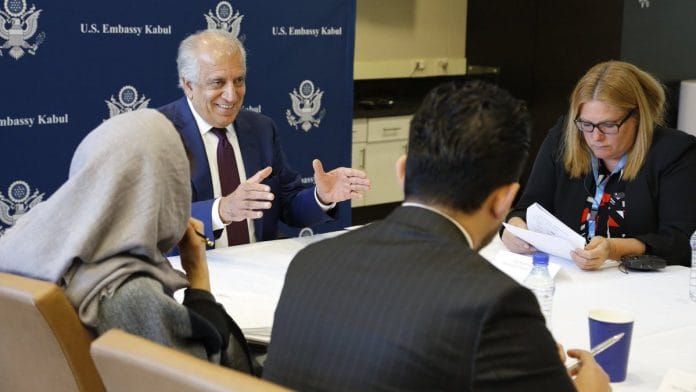US President Donald Trump had appointed Zalmay Khalilzad as the country’s envoy for peace and reconciliation talks in Afghanistan last year.
New Delhi: It is not by chance that, suddenly, the world is looking at Zalmay Khalilzad, the US Special Representative for Afghanistan Reconciliation, to help bring peace and stability to the country, which has been ravaged by war for 18 years.
In the past, too, Khalilzad has been America’s go-to man in dealings with Afghan leaders like former President Hamid Karzai, and, more importantly, the warlords.
Khalilzad, appointed as the envoy for peace and reconciliation talks in Afghanistan by US President Donald Trump last September, has just completed another round of talks with the Taliban in Qatar and meetings with Pakistan officials in Islamabad.
He has held several rounds of talks with the insurgents in Qatar, the last meeting being in December 2018.
Khalilzad was Trump’s first choice in his attempt to bring peace and stability in Afghanistan even as he ordered a reduction of US troops stationed there. He enjoys a good rapport with the US President, who has given him a mandate to settle the Afghanistan issue once and for all.
Also read: NATO does not want India at Afghanistan peace talks table
India’s concerns with Khalilzad’s peace moves
India has become increasingly concerned about the situation in Afghanistan, with the US and the Taliban agreeing to engage directly.
It is making every effort to engage with Khalilzad even though it continues to question his appointment by the US.
India feels Khalilzad is engaging actively with Pakistan in these negotiations because he believes Islamabad is a key player in the process.
India is officially not a party to the talks. This is because India believes the peace process is being steered on US terms and is not led by the Afghan government.
Indian Army chief General Bipin Rawat stated recently that India should also start engaging with the Taliban in regional interest, but without conditions.
Who is Zalmay Khalilzad?
Born in Mazar-e-Sharif, Afghanistan, in 1951, Khalilzad shifted with his family to Kabul, where his father worked as a civil servant. He came to the US for higher studies and stayed back.
After a decade of teaching at Columbia University, he began working at the State Department and the Pentagon around the mid-1980s.
Khalilzad’s usefulness lies in his direct access to Afghan leaders and warlords, including the Taliban, after the 9/11 attacks that led the US, under President George W. Bush, to declare the ‘War Against Terror’ in Afghanistan with the aim to flush out al-Qaeda terrorists from the region.
Khalilzad gained prominence when he worked under former US defence secretary Dick Cheney during the Gulf War in 1991 and helped shape the Defence Planning Guidance, which laid down America’s military planning after the end of the Cold War.
An avowed Republican, Khalilzad never enjoyed a warm relationship with the Democrats.
He even fell out with former US president Bill Clinton, whom he accused of not doing enough for the development of Afghanistan by way of offering American aid.
Thereafter, he worked at RAND Corporation, a thinktank, where he wrote several papers criticising Clinton between 1993 and 2000.
During this period, he also became a consultant with Unocal Corp, an oil exploration giant, and worked on a gas pipeline between Turkmenistan and Pakistan that ran through Afghanistan, which was under Taliban control between 1996 and 2001.
Also read: Sushma Swaraj meets US envoy for Taliban peace talks, discusses regional group creation
Negotiating skills
Khalilzad was appointed the US envoy to Afghanistan between 2003 and 2005, when he also served as the special presidential envoy to the country. President Bush appointed him to ease tensions in Afghanistan as he eyed a second term in the White House in 2004.
At the time, Khalilzad was a strong advocate of ramping up aid to Afghanistan — a move that would help improve President Bush’s image.
American aid to Afghanistan eventually rose to $1.9 billion in 2004 from $740 million in 2003. During that time, Khalilzad also ensured that the Afghan intelligence service — National Security Directorate — was downsized and its operatives trained by the CIA.
In 2005, Khalilzad had a rough patch with the then US secretary of state Condoleezza Rice, again over the lack of American support for Afghanistan’s development. Eventually, he posted himself in Kabul to move the process forward and used to report directly to the White House, bypassing the State Department.
Never quite liked by the conservative diplomats in the US State Department because of his independent style of operation, Khalilzad enjoys a higher standing within the ranks of the CIA and the Pentagon for his ability to negotiate with the Taliban and his deep network of contacts there.







Instead of rushing to invade Afghanistan immediately after 9 / 11, showing what a decisive “ war time President “ he was, perhaps George Bush ought to have tried diplomacy with the Taliban, using resources like Zalmay Khalilzad. The war on terror has cost $ 5.9 trillion so far, and neither the world, nor Afghanistan, is completely safe. Mr Khalilzad also served as envoy to Iraq, an even less justified invasion. 2. Whether Afghanistan or elsewhere in the neighbourhood, India no longer seems to be having the last word.